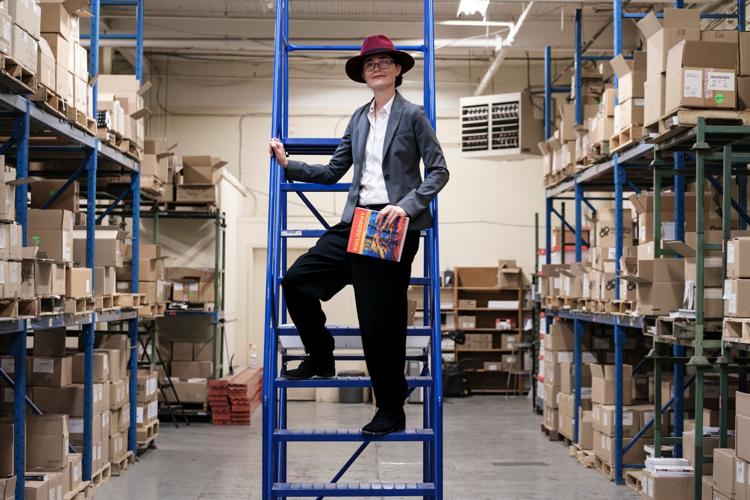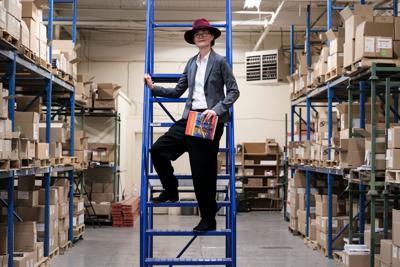For the past 27 years, shipping to the United States has been a no-brainer for Martha Kovack, who sells a╠²literacy card game for children that began as a kitchen-table idea with her sister-in-law.
Depending on the month, 20 to 50 per cent of her sales came from the U.S., and all it took was a quick trip to the post office near her home in Barrie, Ont., where she filled out a customs form and popped her package in the mail.
That routine came to an abrupt end on Aug. 22, when Kovack, the founder of Sound Readers, reluctantly emailed her more than 2,000 U.S. customers to inform them of some bad news: Aug. 25 would be the last day she would accept orders from south of the border.╠²
Donald Trump’s administration was ending the American import duty exemption for goods valued at less than $800, known as the “de minimis” exemption, within a week. That meant for every game Kovack shipped across the U.S. border, she would have to pay a 50 per cent tariff because her products were printed in India.
Originally set to take effect in 2027 under the One Big Beautiful Bill Act, the elimination of the de minimis exemption was fast-tracked by Trump at the end of July, moving the start date to Aug. 29.
The swift change to duty-collection requirements caught many courier and postal services off guard, sending global postal traffic to the U.S. plunging 81 per cent the week before September. Many Canadian businesses rushed to decipher the new regulations and consult with brokers and carriers, with some halting shipments temporarily and others being compelled to cease operations after deeming duties unaffordable.
“It’s like the end of an era for everybody, for people like me who have really enjoyed my customers in the U.S.,” said Kovack,╠²who sells a set of card games for $36.
For 20 years,╠²she has╠²relied on the same printer in India to produce her phonics card games╠²because she has not found a Canadian company capable of printing playing cards and handling all the packaging without outsourcing production to Asia.
The U.S. applies tariffs based on the country of manufacture╠²ŌĆö not the country of export ŌĆö╠²meaning her card games now face a 50 per cent tariff that the U.S. doubled on Indian goods in August.
“With the added cost of tariffs, not to mention the longer shipping time, because now it has to clear customs, there’s no way that my customers or I would be able to bear any more cost,” said Kovack, a dyslexia interventionist who helps students with special needs learn to read.
In the frantic three days following Aug. 22, Kovack scrambled to ship her final U.S. orders, which poured in after she announced she would be terminating shipments to that country.╠²She was unable to fulfil roughly $17,000 in orders, as couriers warned they could not guarantee delivery across the border before the de minimis exemption expired.
Kovack knows she is fortunate to have a growing Canadian customer base to fall back on. But for companies that depend more heavily╠²on U.S. sales, the future looks╠²precarious.
Gelaine Santiago, 35, founder of Toronto-based jewelry company Cambio & Co., which links the Filipino diaspora to their heritage through Philippine-made accessories, told the Star that 80 per cent of her orders go to the U.S., where her ethnic community is far larger than in Canada.
Santiago said she already pays duties on the merchandise she imports from the Philippines. With the suspension of the de minimis exemptions, she now╠²faces an additional 19 per cent tariff to ship those goods from her ║ŻĮŪ╔ńŪ°╣┘═°warehouse to the U.S.
“This is a serious threat to our company’s ability to keep going,” she said, adding that it’s been the toughest year in her decade-old business because╠²Trump’s ever-changing trade policies make╠²planning nearly impossible.╠²
“It has really felt like you’re getting punched every single day, trying to find a way to roll with the punches and figure it out,” Santiago said.
After a month of preparation, she has just set up a warehouse in New York state at╠²a cost of more than $10,000 to serve as the importer of her goods. She said a local warehouse would shield her U.S. customers from surprise bills while allowing wholesale imports to face lower tariffs.
With these added╠²costs and tariffs piling up, Santiago said she would have no choice but to raise prices, but hasnŌĆÖt yet settled on how much.
“We’ve built a really amazing customer base for the past 10 years,” she said. “So I’m just hopeful that people will understand and that they’ll still want to continue to support and shop with us.”
The end of the de minimis exemption is hitting businesses of all sizes, from mom-and-pop shops to multinational companies that set up distribution centres or bonded facilities in Canada to serve U.S. e-commerce demand,╠²said Michael Zobin, director of global trade consulting at the customs brokerage firm Livingston.
Vancouver-based Lululemon Athletica said in its earnings call in September that it expects an impact of about $240 million (U.S.)╠²on its 2025 gross profit from higher tariffs and the removal of the de minimis exemption.
Zobin said small businesses are more vulnerable to the changes because no matter how they adapt, more costs will come along.
In theory, Canadian companies could carve out an exemption from the U.S.ŌĆÖs blanket 35 per cent tariff announced in August, if enough of their product is made or assembled in North America, qualifying them for duty-free benefits under the Canada-United States-Mexico Agreement (CUSMA).
But Zobin cautioned that the paperwork and brokerage fees associated with compliance can, in some cases, outweigh the benefit, making it cheaper to just pay the tariff.
Christine Handley, vice-president of sales and distribution at Broadview Press, said this is exactly the dilemma the 40-year-old academic publisher in Peterborough, Ont., is facing.
Broadview Press, which has sold textbooks to 1,300 U.S. campuses and 150 Canadian schools over the past five years, made 4,927 shipments to the U.S. last year, with 90 per cent of them falling under the de minimis exemption.
“Every single shipment now requires a formal customs entry. We have to do the math on each one at our end,” Handley said.
Broadview PressŌĆÖs primary courier charges the company between╠²$40 and $55 (U.S.) per shipment to certify the books as eligible under CUSMA. Handley found that for parcels valued under $115, itŌĆÖs cheaper to pay the 35 per cent tariff plus the lower brokerage fee than to go through the compliance process.
Regardless of which option╠²her company╠²chooses, Handley expects costs to rise by a ŌĆ£staggeringŌĆØ hundreds of thousands of dollars per year,╠²posing a serious challenge to the business model of a small company with 30 employees and $4 million in annual sales.
She added that she is working on negotiating a lower brokerage fee and hopes that the company can dispute╠²any levied tariff later, even if it has to pay it upfront.
TrumpŌĆÖs executive order also sent shock waves through the postal service and commercial courier industries.
Canada Post said on its website that it has partnered with a third-party company, Zonos, to collect duties and remit them directly to U.S. Customs and Border Protection. The Crown agency told the Star that the executive order also requires all postal shipments to pay Trump’s global tariffs╠²regardless of CUSMA qualification.
“At this point, it is likely too early to assess the impact on our business,” Canada Post said in a statement. “Further information and impact will be available in our 2025 third-quarter report.”
Juhee Cha, spokesperson for Chit Chats, a low-cost shipping provider for Canadian e-commerce sellers, told the Star that its shipments had experienced delays at the border in early September, as many clients were still confused about the new rules and provided incorrect╠²information, including invalid Harmonized Tariff Schedule (HTS) codes and missing manufacturing details.
“Since then, we’ve corrected some things on our platform to catch those things sooner,” Cha said. “We’ve had successful crossings and we’re pushing for a better week next week.”
Corinne Pohlmann, executive vice-president of advocacy at the Canadian Federation of Independent Business, told the Star that she recommends businesses seek professional help from brokers if they wish to continue selling to the U.S. Filing CUSMA compliance documentation could be ŌĆ£onerous and complicatedŌĆ│ depending on the products, she said.
Pohlmann added that her association is urging the federal government to return the counter-tariffs it has collected to companies of all sizes to help address the existential threat facing small businesses.
“There are a lot of small companies that are going to be affected, and some of which have to shut their doors. So we need the government to recognize that and find ways to support not just the larger companies, but these smaller firms.”





























To join the conversation set a first and last name in your user profile.
Sign in or register for free to join the Conversation